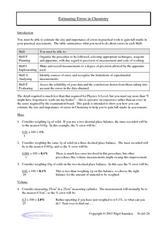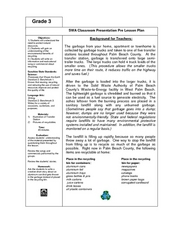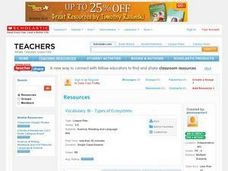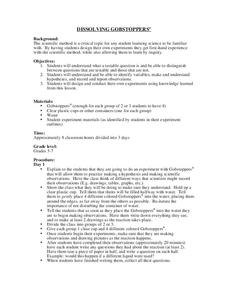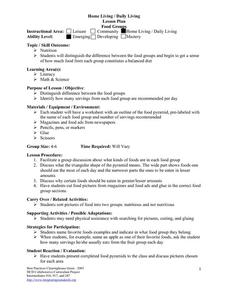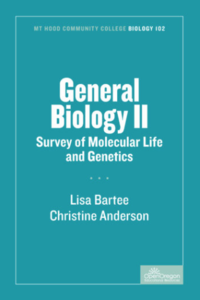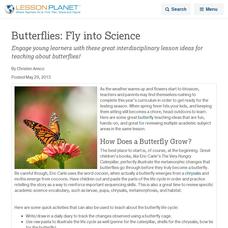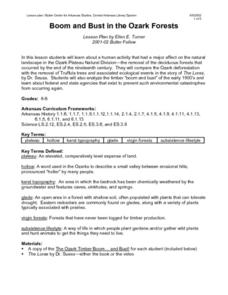Curated OER
Estimating Errors in Chemistry
Estimating Errors in Chemistry is a detailed handout that illustrates the importance of calculating the percent error when working in the chemistry lab. There are no actual problems to solve, just notes and examples of calculations. Hand...
Curated OER
Protecting Natural Resources
Third graders recognize what our natural resources are and their importance. In this natural resource recycling instructional activity, 3rd graders understand why it is important to recycle and conserve natural resources. Students can...
Curated OER
Vocabulary: Types of Ecosystems
Pupils practice using vocabulary words from life science. They will investigate the ecosystem and the terms that are associated with it. In addition, they will complete a fill-in-the-blank exam using the vocabulary words.
Curated OER
Endangered Marine Turtles
Students work in groups and experience what it is like to be a hatchling marine turtle by playing a board game. In this endangered marine turtles instructional activity, students research the threats to marine turtle hatchlings....
It's About Time
Concentrating on Collisions
How important is momentum? Pupils investigate and apply the definition of momentum as they conduct analyses during a series of one-dimensional collisions. They infer the relative masses of two objects by carefully staging and predicting...
Chicago Botanic Garden
Personal Choices and the Planet
How big is your footprint? Activity three culminates the series by having groups complete carbon footprint audits with people in their schools and/or around the districts. Groups then gather their data, create a presentation including...
Curated OER
SCHOOLYARD SUNDIAL
Students study the apparent motion of the Sun in the sky over the course of a day and a year, and analyze what causes seasons on Earth. They participate in a project that has both a science as well as an art component.
Curated OER
Dissolving Gobstoppers
Students design their own experiments . They study the scientific method and determine what a testable question is. They distinguish between questions that are testable and those that are not. They identify variables, make and understand...
Curated OER
Lots of Leaf
In this science worksheet, students read and analyze information about leaves. Students will consider the 5 questions: How is a leaf like a cook? How is a leaf like a fan? How is a leaf like a pair of lungs? How does a leaf affect the...
Curated OER
Home Living/ Daily Living: Food Groups
What are the best foods to eat, and how much is too much? Kids discuss the importance of eating the right amount of each of the four food groups. They discuss the food pyramid and make meals by cutting and pasting foods from a magazine...
ARKive
Dinner at the Reef
Fine dining can happen anywhere, even in the coral reefs. Budding environmentalists explore marine food chains, predator-prey relationships and the importance of a balanced ecosystem. These important concepts are facilitated through a...
Berkshire Museum
Reduce, Reuse, and Recycle: Sorting Through Personal Choices
Raise children's awareness about the importance of conservation with this hands-on science lesson. Start by breaking the class into groups and having them collect trash from around the school or local park. Students then use the provided...
Intel
Cell-to-Cell
The third in a series of 10 STEM project-based lessons focuses on cells types, functions, and physiology. Through research, discussions, writings, and presentations, groups learn about the difference between plant and animal cells, the...
Glynn County School System
Introduction to Astronomy
Get a taste of what the study of the universe entails! A PowerPoint presentation highlights the important aspects of studying astronomy. Packed with facts and images, the presentation is sure to get your class excited about their universe.
Open Oregon Educational Resources
General Biology II: Survey of Molecular Life and Genetics (Mt. Hood Community College Biology 102)
What could be more real life than a biology course? Mt. Hood Community College offers a complete biology textbook with an emphasis on genetics. Topics range from DNA replication to biotechnology and inheritance patterns.
American Museum of Natural History
DNA Detective
DNA is like the fingerprint of genetics. A quick lesson introduces the topic of DNA sequences with a mystery about an endangered species. The lesson shows how DNA extraction, replication, and sequencing often provide undeniable evidence...
Curated OER
Recognizing Litter
When does trash become litter? Use this litter awareness lesson to help them understand the importance of trash disposal. Get learners engaged by reading Nancy Loewen's Lady Lulu Liked to Litter (not included). After discussing what...
Curated OER
Butterflies: Fly into Science
Engage young learners with these great interdisciplinary lesson ideas for teaching about butterflies!
Cornell University
Magnetic Mad Libs
Examine the science behind computer communication. After defining the properties of magnets, learners simulate how a computer hard drive works by sending each other binary codes using the magnets. They use these communications to...
Curated OER
Count Marsili & the Mediterranean Current
Students integrate history and science while discovering how salinity affects the density of water. After a lecture/demo, students work in groups to complete a lab activity that demonstrates how salinity affects the density of water.
Curated OER
Boom and Bust in the Ozark Forests
Here is a hard-hitting, cross-curricular lesson on the effects that the deforestation of the Ozark forests in the 19th century had on the people, animals, and ecosystems of the area. The Dr. Seuss book The Lorax is used as a way of...
Curated OER
A Seashell Lesson: Writing for Detail and the Scientific Process
Practice descriptive language in this lesson, which prompts elementary and middle schoolers to write detailed descriptive sentences describing a seashell. They write a description of a shell, create an illustration, and other students...
Curated OER
Forces of Flight - Lift
Students design and test paper airplanes to understand the concept of lift and how it affects flight. This technology-based Science lesson plan is excellent for use with upper-elementary and middle-level learners and uses spreadsheet...
Curated OER
Water and Ice
Students will observe, measure and describe the phase changes of ice. In this science lesson plan, students observe ice as it changes phases. Qualaitative notations made by individual students will be shared and compared.
